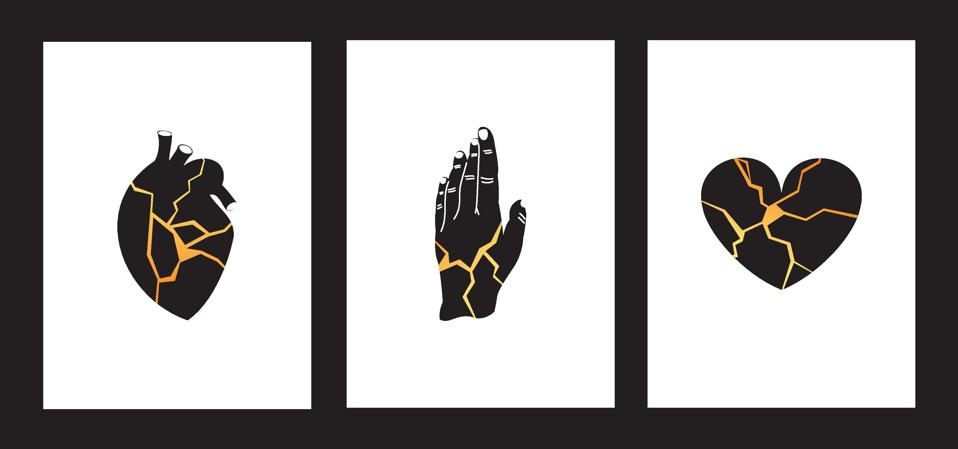Kintsugi is an ancient Japanese art form that offers a profound metaphor for understanding human relationships. Translating to “golden repair,” Kintsugi involves repairing broken pottery with lacquer mixed with gold, silver or platinum. Rather than concealing fractures, Kintsugi celebrates them, transforming flaws into exquisite strokes of beauty. Beyond its aesthetic appeal—it speaks to resilience, acceptance and the transformative power of embracing imperfection.
Here are three invaluable insights Kintsugi offers for nurturing healthy relationships and fostering emotional growth.
1. Celebrate Imperfection
At the core of Kintsugi lies the philosophy of wabi-sabi, which embraces imperfection and transience. In Japanese culture, wabi-sabi celebrates the beauty of things imperfect, impermanent and incomplete. Instead of pursuing flawlessness, wabi-sabi encourages acceptance of life’s inevitable changes and finds beauty within them.
Perfectionism in relationships often leads to disappointment and frustration. Studies show that individuals with maladaptive perfectionism tend to experience higher fear of intimacy. Moreover, perfectionism can affect couples’ sexual lives, particularly for women who feel pressured to meet societal or partner expectations, resulting in decreased sexual intimacy and interaction.
Drawing from the teachings of Kintsugi, we can learn to embrace imperfections as integral parts of our shared history. Similar to how Kintsugi reveals the beauty of mended pottery, we can celebrate the growth and resilience that emerge from facing challenges together.
Rather than expecting flawlessness, it’s important to recognize that no relationship is perfect. By viewing flaws not as obstacles but as integral parts of our partner’s identity and our shared journey, we can transform these imperfections into opportunities for growth and deeper connection. Additionally, accepting imperfections fosters authenticity, creating a safe space where vulnerability is welcome and flaws are met with empathy. This strengthens commitment to the relationship and prepares partners to confront challenges together.
2. Craft Your Resilience
The philosophy of Kintsugi emphasizes that resilience is not merely about bouncing back from adversity but also about embracing the process of repair and renewal. Just like the meticulous process of fixing broken pottery, relationships demand patience, effort and care to mend snags in your relational fabric.
Resilience entails a commitment to working through conflicts and setbacks with love and understanding. Through open communication, empathy and compromise, we fortify the foundation of our relationships and emerge stronger than before. A study published in Women and Therapy suggests that resilience can be nurtured and reinforced in all individuals through engaging in growth-fostering relationships.
For example, openly discussing challenges with a partner strengthens the bond and enhances problem-solving skills. Affirmations and compliments from a partner boost confidence and self-worth. Collaborating on shared goals—like planning a vacation or managing finances— fosters teamwork and empowerment. Engaging in intellectual discussions or sharing hobbies stimulates mutual learning and intellectual growth. Moreover, regular date nights or quality time together deepen the emotional connection and intimacy in the relationship.
Further, just as repaired pottery becomes more valuable and beautiful, our relationships can evolve by overcoming trials. The scars and challenges we navigate together become part of our shared history, enriching the depth and resilience of our bond. Like the seams of gold in Kintsugi, our relationships emerge even more exquisite and precious after the process of repair and renewal.
3. Honor Transformation
Rather than disguising flaws or clinging to past perfection, the act of repairing broken pottery symbolizes and acknowledges the evolution of both objects and relationships over time.
In human relationships, embracing transformation entails allowing each individual to evolve independently while also growing together as a unit. Recognizing and embracing the changes that occur over time fosters ongoing growth and renewal within our relationships. Research confirms that when individuals undergo personal self-expansion—experiencing positive self-change and growth independently from their romantic partner—they also experience heightened passion in their romantic relationships.
Honoring the evolution of our relationship and appreciating the beauty that emerges involves:
- Embracing the journey of transformation with openness and gratitude. A study published in Emotion suggests that gratitude from interactions predicts increased relationship connection and satisfaction, potentially enhancing the relationship.
- Acknowledging that every experience, whether joyful or challenging, contributes to the depth of our shared story.
- Willingness to let go of old patterns and embrace new possibilities. It means allowing ourselves and our partners to evolve and change, while still holding onto the core values and commitments that bind us together.
By embracing change with grace and acceptance, we cultivate a relationship that is adaptable, resilient and brimming with potential.
Could your relationship benefit from the healing properties of the Kintsugi mindset? Take the Relationship Satisfaction Scale to know for sure.

